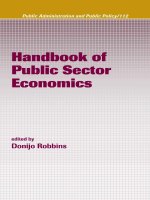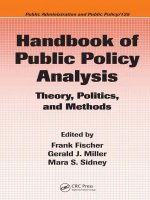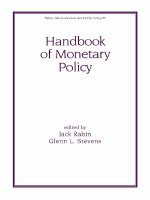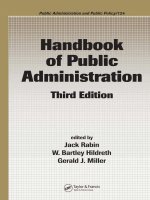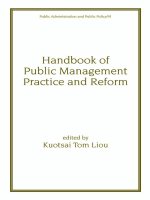Handbook of Public Sector Economics potx
Bạn đang xem bản rút gọn của tài liệu. Xem và tải ngay bản đầy đủ của tài liệu tại đây (2.47 MB, 794 trang )
Handbook of
Public Sector
Economics
DK3644_half 01/25/2005 9:45 AM Page i
PUBLIC ADMINISTRATION AND PUBLIC POLICY
A Comprehensive Publication Program
Executive Editor
JACK RABIN
Professor of Public Administration and Public Policy
School of Public Affairs
The Capital College
The Pennsylvania State University—Harrisburg
Middletown, Pennsylvania
Assistant to the Executive Editor
T. Aaron Wachhaus, Jr.
1. Public Administration as a Developing Discipline, Robert T.
Golembiewski
2. Comparative National Policies on Health Care,
Milton I. Roemer, M.D.
3. Exclusionary Injustice: The Problem of Illegally Obtained
Evidence, Steven R. Schlesinger
5. Organization Development in Public Administration, edited
by Robert T. Golembiewski and William B. Eddy
7. Approaches to Planned Change, Robert T. Golembiewski
8. Program Evaluation at HEW, edited by James G. Abert
9. The States and the Metropolis, Patricia S. Florestano
and Vincent L. Marando
11. Changing Bureaucracies: Understanding the Organization
before Selecting the Approach, William A. Medina
12. Handbook on Public Budgeting and Financial Management,
edited by Jack Rabin and Thomas D. Lynch
15. Handbook on Public Personnel Administration and Labor
Relations, edited by Jack Rabin, Thomas Vocino,
W. Bartley Hildreth, and Gerald J. Miller
19. Handbook of Organization Management, edited by
William B. Eddy
20. Organization Theory and Management, edited by
Thomas D. Lynch
22. Politics and Administration: Woodrow Wilson and American
Public Administration, edited by Jack Rabin
and James S. Bowman
23. Making and Managing Policy: Formulation, Analysis,
Evaluation, edited by G. Ronald Gilbert
PPP_series 01/07/2005 3:28 PM Page 1
25. Decision Making in the Public Sector, edited by
Lloyd G. Nigro
26. Managing Administration, edited by Jack Rabin,
Samuel Humes, and Brian S. Morgan
27. Public Personnel Update, edited by Michael Cohen
and Robert T. Golembiewski
28. State and Local Government Administration, edited by
Jack Rabin and Don Dodd
29. Public Administration: A Bibliographic Guide to the
Literature, Howard E. McCurdy
31. Handbook of Information Resource Management, edited by
Jack Rabin and Edward M. Jackowski
32. Public Administration in Developed Democracies:
A Comparative Study, edited by Donald C. Rowat
33. The Politics of Terrorism: Third Edition, edited by Michael
Stohl
34. Handbook on Human Services Administration, edited by
Jack Rabin and Marcia B. Steinhauer
36. Ethics for Bureaucrats: An Essay on Law and Values,
Second Edition, John A. Rohr
37. The Guide to the Foundations of Public Administration,
Daniel W. Martin
39. Terrorism and Emergency Management: Policy
and Administration, William L. Waugh, Jr.
40. Organizational Behavior and Public Management:
Second Edition, Michael L. Vasu, Debra W. Stewart, and
G. David Garson
43. Government Financial Management Theory, Gerald J. Miller
46. Handbook of Public Budgeting, edited by Jack Rabin
49. Handbook of Court Administration and Management,
edited by Steven W. Hays and Cole Blease Graham, Jr.
50. Handbook of Comparative Public Budgeting and Financial
Management, edited by Thomas D. Lynch
and Lawrence L. Martin
53. Encyclopedia of Policy Studies: Second Edition,
edited by Stuart S. Nagel
54. Handbook of Regulation and Administrative Law, edited by
David H. Rosenbloom and Richard D. Schwartz
55. Handbook of Bureaucracy, edited by Ali Farazmand
56. Handbook of Public Sector Labor Relations, edited by
Jack Rabin, Thomas Vocino, W. Bartley Hildreth,
and Gerald J. Miller
57. Practical Public Management, Robert T. Golembiewski
58. Handbook of Public Personnel Administration, edited by
Jack Rabin, Thomas Vocino, W. Bartley Hildreth,
and Gerald J. Miller
PPP_series 01/07/2005 3:28 PM Page 2
60. Handbook of Debt Management, edited by Gerald J. Miller
61. Public Administration and Law: Second Edition,
David H. Rosenbloom and Rosemary O’Leary
62. Handbook of Local Government Administration,
edited by John J. Gargan
63. Handbook of Administrative Communication, edited by
James L. Garnett and Alexander Kouzmin
64. Public Budgeting and Finance: Fourth Edition, edited by
Robert T. Golembiewski and Jack Rabin
65. Handbook of Public Administration: Second Edition, edited by
Jack Rabin, W. Bartley Hildreth, and Gerald J. Miller
66. Handbook of Organization Theory and Management:
The Philosophical Approach, edited by Thomas D. Lynch
and Todd J. Dicker
67. Handbook of Public Finance, edited by Fred Thompson
and Mark T. Green
68. Organizational Behavior and Public Management:
Third Edition, Michael L. Vasu, Debra W. Stewart, and
G. David Garson
69. Handbook of Economic Development, edited by
Kuotsai Tom Liou
70. Handbook of Health Administration and Policy, edited by
Anne Osborne Kilpatrick and James A. Johnson
71. Handbook of Research Methods in Public Administration,
edited by Gerald J. Miller and Marcia L. Whicker
72. Handbook on Taxation, edited by W. Bartley Hildreth
and James A. Richardson
73. Handbook of Comparative Public Administration
in the Asia-Pacific Basin, edited by Hoi-kwok Wong
and Hon S. Chan
74. Handbook of Global Environmental Policy and
Administration, edited by Dennis L. Soden and Brent S. Steel
75. Handbook of State Government Administration, edited by
John J. Gargan
76. Handbook of Global Legal Policy, edited by Stuart S. Nagel
78. Handbook of Global Economic Policy, edited by
Stuart S. Nagel
79. Handbook of Strategic Management: Second Edition,
edited by Jack Rabin, Gerald J. Miller, and W. Bartley
Hildreth
80. Handbook of Global International Policy, edited by
Stuart S. Nagel
81. Handbook of Organizational Consultation: Second Edition,
edited by Robert T. Golembiewski
82. Handbook of Global Political Policy, edited by Stuart S. Nagel
PPP_series 01/07/2005 3:28 PM Page 3
83. Handbook of Global Technology Policy, edited by
Stuart S. Nagel
84. Handbook of Criminal Justice Administration, edited by
M. A. DuPont-Morales, Michael K. Hooper, and Judy H.
Schmidt
85. Labor Relations in the Public Sector: Third Edition,
edited by Richard C. Kearney
86. Handbook of Administrative Ethics: Second Edition,
edited by Terry L. Cooper
87. Handbook of Organizational Behavior: Second Edition, edited
by Robert T. Golembiewski
88. Handbook of Global Social Policy, edited by Stuart S. Nagel
and Amy Robb
89. Public Administration: A Comparative Perspective,
Sixth Edition, Ferrel Heady
90. Handbook of Public Quality Management, edited by
Ronald J. Stupak and Peter M. Leitner
91. Handbook of Public Management Practice and Reform,
edited by Kuotsai Tom Liou
92. Personnel Management in Government: Politics and Process,
Fifth Edition, Jay M. Shafritz, Norma M. Riccucci,
David H. Rosenbloom, Katherine C. Naff, and Albert C. Hyde
93. Handbook of Crisis and Emergency Management,
edited by Ali Farazmand
94. Handbook of Comparative and Development Public
Administration: Second Edition, edited by Ali Farazmand
95. Financial Planning and Management in Public Organizations,
Alan Walter Steiss and Emeka O. Cyprian Nwagwu
96. Handbook of International Health Care Systems, edited by
Khi V. Thai, Edward T. Wimberley, and Sharon M. McManus
97. Handbook of Monetary Policy, edited by Jack Rabin
and Glenn L. Stevens
98. Handbook of Fiscal Policy, edited by Jack Rabin
and Glenn L. Stevens
99. Public Administration: An Interdisciplinary Critical Analysis,
edited by Eran Vigoda
100. Ironies in Organizational Development: Second Edition,
Revised and Expanded, edited by Robert T. Golembiewski
101. Science and Technology of Terrorism and Counterterrorism,
edited by Tushar K. Ghosh, Mark A. Prelas,
Dabir S. Viswanath, and Sudarshan K. Loyalka
102. Strategic Management for Public and Nonprofit
Organizations, Alan Walter Steiss
103. Case Studies in Public Budgeting and Financial Management:
Second Edition, edited by Aman Khan and W. Bartley
Hildreth
PPP_series 01/07/2005 3:28 PM Page 4
104. Handbook of Conflict Management, edited by William J.
Pammer, Jr. and Jerri Killian
105. Chaos Organization and Disaster Management, Alan
Kirschenbaum
106. Handbook of Gay, Lesbian, Bisexual, and Transgender
Administration and Policy, edited by Wallace Swan
107. Public Productivity Handbook: Second Edition, edited by
Marc Holzer
108. Handbook of Developmental Policy Studies, edited by
Gedeon M. Mudacumura, Desta Mebratu and M. Shamsul
Haque
109. Bioterrorism in Medical and Healthcare Administration, Laure
Paquette
110. International Public Policy and Management: Policy Learning
Beyond Regional, Cultural, and Political Boundaries, edited
by David Levi-Faur and Eran Vigoda-Gadot
111. Handbook of Public Information Systems, Second Edition,
edited by G. David Garson
112. Handbook of Public Sector Economics, edited by Donijo
Robbins
113. Handbook of Public Administration and Policy in the
European Union, edited by M. Peter van der Hoek
114. Nonproliferation Issues for Weapons of Mass Destruction,
Mark A. Prelas and Michael S. Peck
Available Electronically
Principles and Practices of Public Administration, edited by
Jack Rabin, Robert F. Munzenrider, and Sherrie M. Bartell
PPP_series 01/07/2005 3:28 PM Page 5
edited by
Donijo Robbins
Grand Valley State University
Grand Rapids, Michigan
Handbook of
Public Sector
Economics
DK3644_title 01/21/2005 4:55 PM Page i
This book contains information obtained from authentic and highly regarded sources. Reprinted
material is quoted with permission, and sources are indicated. A wide variety of references are
listed. Reasonable efforts have been made to publish reliable data and information, but the author
and the publisher cannot assume responsibility for the validity of all materials or for the conse-
quences of their use.
Neither this book nor any part may be reproduced or transmitted in any form or by any means,
electronic or mechanical, including photocopying, microfilming, and recording, or by any infor-
mation storage or retrieval system, without prior permission in writing from the publisher.
All rights reserved. Authorization to photocopy items for internal or personal use, or the personal
or internal use of specific clients, may be granted by CRC Press, provided that $1.50 per page
photocopied is paid directly to Copyright Clearance Center, 222 Rosewood Drive, Danvers, MA
01923 USA. The fee code for users of the Transactional Reporting Service is ISBN 1-57444-562-
6/05/$0.00+$1.50. The fee is subject to change without notice. For organizations that have been
granted a photocopy license by the CCC, a separate system of payment has been arranged.
The consent of Marcel Dekker and CRC Press does not extend to copying for general distribution,
for promotion, for creating new works, or for resale. Specific permission must be obtained in
writing from Marcel Dekker/CRC Press for such copying.
Direct all inquiries to CRC Press, 2000 N.W. Corporate Blvd., Boca Raton, FL 33431.
Trademark Notice:
Product or corporate names may be trademarks or registered trademarks,
and are used only for identification and explanation, without intent to infringe.
Visit the CRC Press Web site at www.crcpress.com
© 2005 by Marcel Dekker/CRC Press LLC
No claim to original U.S. Government works
International Standard Book Number 1-57444-562-6
Library of Congress Card Number 2004059312
Printed in the United States of America 1 2 3 4 5 6 7 8 9 0
Printed on acid-free paper
Library of Congress Cataloging-in-Publication Data
Handbook of public sector economics / Donijo Robbins [editor].
p. cm.
Includes bibliographical references and index.
ISBN 1-57444-562-6
1. Finance, Public. I. Robbins, Donijo.
HJ141.H3634 2004
336 dc22 2004059312
To my parents
Don and Marijo
v
Preface
The Handbook of Public Sector Economics
is first and foremost a
textbook for graduate students in public administration and public
policy. Although most handbooks are used as reference texts, this
particular handbook was proposed and written as a textbook to be
used as the primary book in a graduate public economics course or
an important secondary or supplementary book in a public finance
or public policy course in a program where a course in public eco-
nomics is not offered. The primary goal of this book is to contribute
to the use and understanding of public economics and its role in
public administration, public policy, and decision making. The book
exposes students of public policy and administration to a wide array
of current issues surrounding the public provision and production
of goods and services.
Three major reasons, I believe, explain the usefulness of such a
text. First, the book documents the history of economics and fiscal
doctrine and their place in public policy and administration. Second,
it provides a comprehensive exploration of the theory of public goods
and the structures from which resources are collected and expended.
Finally, it explores the emerging and heavily-debated issues of
economics that are important to students, faculty, and practitioners;
vi Robbins
for example, the effects of fiscal policies on saving and investment,
consumer behavior, labor supply, wealth, property, and trade. These
important reasons guided the development and organization of this
text.
Unlike textbooks, this handbook has no pictures, unless a supply
and demand figure is considered a picture. Another constraint is
that not all issues of public economics are included; for example,
specialization and the different market systems are not discussed.
My rationale for leaving out such topics, albeit important, rests on
a belief that most graduate students in public administration and
public policy have been exposed to these subjects in an undergrad-
uate economics course. If not, consulting an undergraduate intro-
ductory text should clear up questions that this book does not
address.
Each chapter was written specifically for this book and in a
manner that is simple and straightforward; as such the text is easy
to follow and understand. Although each chapter could stand alone,
the flow of the book was put together in such a way that the first
two parts establish the foundation of public economics. In addition,
each part substantiates the aforementioned reasons for this book.
Part I introduces public economics, fiscal doctrine, and the role
of democracy and bureaucracy within the economic framework.
Lynn C. Burbridge begins, in Chapter 1, with the history of econom-
ics and its doctrines from the Classical economists to the Marxists.
Fiscal systems and functions are presented by William Voorhees in
Chapter 2. Together, the first two chapters summarize the theory
and practice of fiscal doctrine. In Chapter 3, Jane Beckett-Camarata
addresses market efficiency and failure within the realm of demo-
cratic decision-making. Chapter 4 concludes Part I with Patricia
Moore outlining the role of bureaucracy and bureaucrats.
Part II focuses on the theory of public goods. Paul C. Trogen
defines public goods and Robert J. Eger III provides a detailed
analysis of the provision and production of public goods in Chapters
5 and 6, respectively.
Part III addresses the collection and distribution of government
resources. In Chapter 7, Carol Ebdon explains revenue sources, the
equity and efficiency of collecting revenues, and current trends and
implications. Building on fiscal federalism, Suzanne Leland pre-
sents the fiscal characteristics of public expenditures in Chapter 8.
Chapter 9, written by Shama Gamkhar, defines and analyzes inter-
governmental grants. The collection and distribution of resources
are not always in balance. Gary R. Rassel discusses, in Chapter 10,
Preface vii
this imbalance by outlining its history and analyzes the impact of
public debt in the United States. The section concludes with appli-
cations of economic theory. John R. Bartle examines transportation
infrastructure and Donijo Robbins and Gerald J. Miller evaluate e-
government technology expenditures in Chapters 11 and 12, respec-
tively.
Part IV concludes the textbook and is composed of five chapters
focusing on market reactions to fiscal policies. In Chapter 13, Gerald
J. Miller provides an overview of the size, scope, and role of government
in the market system, its policies, and their impact on saving, invest-
ment, and productivity. Helisse Schayowitz, in Chapter 14, introduces
the household decision-making process and discusses consumer reac-
tion to taxation. John D. Wong, in Chapter 15, offers a detailed over-
view and analysis of the income, corporate, and social security taxes
on the supply of labor. In Chapter 16, Renée Irvin defines wealth and
examines the policies affecting wealth accumulation. Chapter 17 con-
cludes Part IV and the text with Rafael Reuveny presenting the scope
and the gains from international trade, as well as the impact of free
trade, restrictions, and international politics.
Finally, many labored to complete this project. I thank the con-
tributors for their efforts and patience, Jack Rabin for his encourage-
ment and support of the initial proposal, the production staff at
Marcel Dekker, and my graduate assistant, Genevieve Verhoeven, for
her help with this project. We welcome comments and feedback to
improve future editions of this text.
Donijo Robbins
Grand Rapids, Michigan
ix
Contributors
John R. Bartle
is a professor in the School of Public Administration
at the University of Nebraska at Omaha. He teaches and does
research in the areas of public finance policy and management,
public budgeting, applied economics, and transportation. He has
been published in a number of journals including
Public Budgeting
& Finance
,
State and Local Government Review
, and
Journal of Public
Administration Research and Theory
, and he is the editor of the book
Evolving Theories of Public Budgeting
(2001). His doctorate is from
the School of Public Policy and Management at The Ohio State
University.
Jane Beckett-Camarata
is an assistant professor of political sci-
ence at Kent State University. She teaches in the doctoral program
in public policy and the master’s program in public administration.
Beckett-Camarata earned her Ph.D. in public policy and adminis-
tration from Virginia Commonwealth University in 1998. Her
research interests include tax policy, comparative budgeting and tax
systems, economic development financing, and intergovernmental
fiscal relations. Beckett-Camarata’s most recent article examines
the effect of taxation as an incentive in revitalizing urban local
x Robbins
economic development in Elizabeth, New Jersey. She has written
about financial emergencies and financial condition analysis and is
extending that research into the relationship between revenue fore-
casting accuracy and financial emergencies. She has published arti-
cles in
Journal of Public Finance and Management
,
Journal of
Public Budgeting, Accounting & Financial Management
,
Municipal
Finance Journal,
and
Journal of Business Research
. She is a mem-
ber of the Executive Council of the American Society for Public
Administration (ASPA) and is an active member of Association of
Budgeting and Financial Management (ABFM) and other profes-
sional organizations.
Lynn Burbridge
has a Ph.D. in economics from Stanford Univer-
sity. She has worked at the Urban Institute and the Center for
Research on Women at Wellesley College. She has also taught at
Wellesley College and Rutgers University, Newark Campus. Her
work has focused on a number of public policy issues, the role of
the nonprofit sector in the U.S. economy, and the history of thought
in economics.
Carol Ebdon
is an associate professor in the School of Public
Administration at the University of Nebraska at Omaha. She
received a Ph.D. in public administration from the University at
Albany, State University of New York. Her primary research and
teaching interests are in the areas of public budgeting and finance.
Recent research includes work in local government revenue diver-
sification, capital management, and citizen participation in the bud-
get process.
Robert J. Eger III
is an assistant professor of public administra-
tion and urban studies in the Andrew Young School of Policy Studies
at Georgia State University. His pursuit of the development and
application of budgeting, finance, economic, and accounting principles
to public entities has rewarded him with opportunities to work with
an assortment of state, local, and single-purpose government orga-
nizations. Eger’s recent work has focused on price indexing for state
contracts in the volatile petroleum industry. He has an extensive
management background in both the public and private sectors.
Shama Gamkhar
is an Associate Professor at the Lyndon B.
Johnson School of Public Affairs, University of Texas, Austin, TX.
She teaches courses on public finance, financial management and
Contributors xi
environmental economic policy. Her research interests include fiscal
federalism, intergovernmental grants, public school finance, and
environmental policy. She received a Ph.D. in economics from the
University of Maryland at College Park. She is the author of
Federal
Intergovernmental Grants and the States: Managing Devolution
published by Edward Elgar in its series Studies in Fiscal Federalism
and State and Local Finance. Her research papers have been pub-
lished in the
National Tax Journal, Public Finance Review, Public
Budgeting and Finance, Journal of Health Politics, Policy and Law
and
National Tax Association Papers and Proceedings. C
urrently,
she serves on a committee for the study of the long-term viability
of the fuel tax for transportation finance conducted by the Trans-
portation Research Board of the National Academies.
Renée A. Irvin
is an economist specializing in research on wealth
and nonprofit enterprise. Irvin joined the University of Oregon fac-
ulty in Fall 2001, where she serves as assistant professor of plan-
ning, public policy and management, as well as director of the
Graduate Certificate in Not-for-Profit Management. Her current
research includes regional wealth distribution and philanthropic
capacity mapping, the role of private philanthropy in regional gov-
ernment finance, and economic modeling of community foundation
formation and growth.
Suzanne Leland
is currently an assistant professor in the Political
Science Department at the University of North Carolina, Charlotte.
She teaches in the areas of administrative behavior, urban politics,
and state and local politics. In addition she teaches intergovernmen-
tal relations and public administration theory in the Master’s of
Public Administration program. Leland received her Ph.D. in polit-
ical science from the University of Kansas in August 1999.
Helisse Levine-Schayowitz
is presently a Ph.D. candidate in the
Graduate Department of Public Administration at Rutgers Univer-
sity, Campus at Newark. She has taught for the Department of
Economics at Rutgers University, Campus at Newark for several
years as a part-time lecturer and for the Department of Economics
and Finance at Fairleigh Dickinson University, College at Florham.
In addition, she has taken every opportunity to teach while pursuing
her degree and has most recently taught for the Masters of Public
Administration at Rutgers University, Campus at Newark while
completing her dissertation. Her teaching experience includes sta-
xii Robbins
tistics, research methods, principles of economics, political economy
and public administration, and capital budgeting. Levine-Schayowitz
received her undergraduate degree in economics and a master’s
degree in financial economics. Her thesis work is in the area of
public management and finance, with emphasis on statewide debt
management policy and the municipal securities market.
Gerald J. Miller
is professor of public administration at Rutgers,
the State University of New Jersey in Newark. There he teaches
government and nonprofit financial management. Miller has pub-
lished 70 research articles, chapters, and monographs; they have
appeared in the
Arbitration Journal
(now
Dispute Resolution Jour-
nal of the American Arbitration Association
),
International Journal
of Public Administration, Journal of Public Budgeting, Accounting
and Financial Management, Policy Studies Journal, Public Admin-
istration Quarterly, Public Administration Review, Public Budgeting
and Finance, Public Performance and Management Review, Public
Personnel Management,
and
Review of Public Personnel Adminis-
tration.
He has published 19 books. He authored
Government Finan-
cial Management Theory
and edited the
Handbook of Debt Manage-
ment
. His coauthored and co-edited books include
Performance-
Based Budgeting
,
Public Budgeting Laboratory
(through two and
an upcoming third edition),
Budgeting
,
Handbook of Public Admin-
istration
(through two and an upcoming third edition), and
Hand-
book of Strategic Management
(now in a second edition). He is also
writing a research methods text (with Dr. Donijo Robbins) and has
co-edited a research methods handbook (with Dr. Marcia Whicker).
He earned his Ph.D. in political science from the University of
Georgia. He received a B.S. in economics from Auburn University
and an M.P.A. degree from Auburn University (Montgomery).
Patricia Moore
is assistant professor of public administration at
Kean University in Union, New Jersey. She has a Ph.D. from Rut-
gers University, specializing in public budgeting and financial man-
agement. Her research interests are budget and organization theory.
Moore has published articles on the following topics: government
reorganization, budget allocation formula, and resource allocation
in school districts. She has 11 years of diversified administrative
and technical experience working with school districts, municipali-
ties, counties, and private nonprofit organizations in New Jersey.
She is a member of the American Society for Public Administration
and is active in civic and political affairs. Dr. Moore is a member of
Contributors xiii
the board of directors of the Bronx Bethany Corporation in New
York City.
Gary R. Rassel
is Associate Professor of Political Science at the
University of North Carolina at Charlotte. He teaches public bud-
geting and finance, research methods, public administration, and
American government. His research areas include topics in budget-
ing and financial management, state and local government organi-
zation and administration, and art and culture policy. He is coauthor
with Elizabethann O’Sullivan and Maureen Berner of the textbook
Research Methods for Public Administrators
. Rassel has M.A.
degrees from the University of South Dakota and Michigan State
University. His Ph.D. degree is from Michigan State University.
Rafael Reuveny
is associate professor of political economy in the
school of public and environmental affairs at Indiana University,
Bloomington. His research focuses on causes and effects of economic
globalization, causes and effects of political conflict, and sustainable
development. His recent book, entitled
Growth, Trade and Systemic
Leadership,
coauthored with William R. Thompson, was
published in 2004 by Michigan University Press. His papers
appeared or are forthcoming in various academic journals, including
International Studies Quarterly, Journal of Politics, Review of Inter-
national Political Economy, Journal of Peace Research, Journal of
Conflict Resolution, Policy Studies Journal, Policy Sciences, Ecolog-
ical Economics, International Organization, Review of International
Economics
, and
American Journal of Political Science.
Donijo Robbins
is associate professor for the School of Public and
Nonprofit Administration at Grand Valley State University in Grand
Rapids, Michigan, where she teaches graduate and undergraduate
courses in public budgeting, financial management, and research
methods. Robbins received a B.S. degree (1994) in economics and
political science from Central Michigan University and a M.A. degree
(1995) in economics and a Ph.D. degree (1998) in public administra-
tion from Rutgers, The State University of New Jersey in Newark.
Paul C. Trogen
is assistant professor of public finance at East
Tennessee State University in Johnson City, Tennessee. His teaching
interests include public finance, budgeting, public organizations, and
economics. He enjoys researching determinants of economic devel-
opment, interactions between public policies and markets, economic
xiv Robbins
reforms, and public budgeting. He has published articles in
Journal
of Financial and Economic Practice
(
JFEP
),
International Journal
of Economic Development
(
IJED
),
Journal of Public Budgeting,
Accounting, and Financial Management
(
JPBAFM
), and
Southeast-
ern Political Review
(
SPR
). He has also written chapters in the
Handbook of Comparative and Development Administration
(2
nd
edi-
tion) and the
Handbook of Bureaucracy
, both published by Marcel
Dekker. Trogen has a Ph.D. in public administration from Florida
State University (1995), with a concentration in public financial
management.
William Voorhees
is an assistant professor of public finance in the
School of Public Affairs at Arizona State University. His research
and publications have investigated topics such as revenue forecast-
ing, governmental accounting, and tax-exempt bonds. Voorhees is a
member of the Governmental Accounting Standards Advisory Coun-
cil and is on the Executive Board of the Association of Budgeting
and Financial Management. Prior to his teaching career, Dr.
Voorhees was employed for over 20 years in the health care financial
management systems industry. He holds a Ph.D. from the School of
Public and Environmental Affairs, Indiana University at Blooming-
ton, and an M.P.A. degree from the Andrew Young School of Policy
Studies at Georgia State University in Atlanta.
John D. Wong
is associate professor in the Hugo Wall School of
Urban and Public Affairs at Wichita State University (WSU). He
received his Bachelor of Business Administration and Master of Arts
in Economics degrees from WSU, a Juris Doctorate from Washburn
University, and a Doctor of Philosophy degree from Northeastern
University. In 1995, Wong served the Kansas Governor’s Tax Equity
Task Force as a consultant on the distributional impact of tax reform
and the effect of taxation on economic development. He is presently
the principal author of the annual Governor’s Economic and Demo-
graphic Report, senior consulting economist for the official Kansas
Consensus Revenue Estimating Group, a consulting economist for
the Kansas Department of Revenue, and a consulting economist for
the Kansas Department of Human Resources. He has also previ-
ously served as a consultant for several cities and counties. Wong
coauthored State and Local Government Capital Improvement Plan-
ning and Budgeting and Public/Private Partnerships and has writ-
ten extensively on public finance and policy issues including several
articles on revenue forecasting, taxation, electric utility deregula-
Contributors xv
tion, and health care finance, as well as contributions to the
Hand-
book on Taxation
and the State and Local Government Debt Issu-
ance and Management Service. Wong’s primary teaching
responsibility is in the areas of public finance and public policy, and
he has taught graduate level courses in public sector economics,
public finance, local government finance, state and local financial
systems, urban and regional economic development, policy analysis
and program evaluation, and public works. He has also taught
several classes in the areas of criminal justice and law and geron-
tology and has made numerous professional development and train-
ing presentations on fiscal management issues to finance officers
and other state and local government officials. Wong is also licensed
to practice law in Kansas state and federal courts as well as the
U.S. Supreme Court.
xvii
Table of Contents
PART I Introduction to Public Economics
and Fiscal Doctrine
1 The Evolution of Economics: The Search for a Theory
of Value 3
Lynn C. Burbridge
2 Basic Economics of Fiscal Decentralization 87
William Voorhees
3 Voting and Representative Democracy 109
Jane Beckett-Camarata
4 Bureaucracy and Bureaucrats 141
Patricia Moore
xviii Robbins
PART II Theory of Public Goods
5 Public Goods 169
Paul C. Trogen
6 Provision and Production of Public Goods 209
Robert J. Eger III
PART III Collection, Allocation, and Distribution
of Resources
7 Tax Systems and Structures 235
Carol Ebdon
8 Fiscal Characteristics of Public Expenditures 271
Suzanne Leland
9 Intergovernmental Grants 291
Shama Gamkhar
10 Public Debt and Stability 323
Gary R. Rassel
11 Transportation Infrastructure 375
John R. Bartle
12 E-Government Expenditures 407
Donijo Robbins and Gerald J. Miller
PART IV Market Reactions Collection, Allocation,
and Distribution
13 Government Fiscal Policy Impacts 425
Gerald J. Miller
